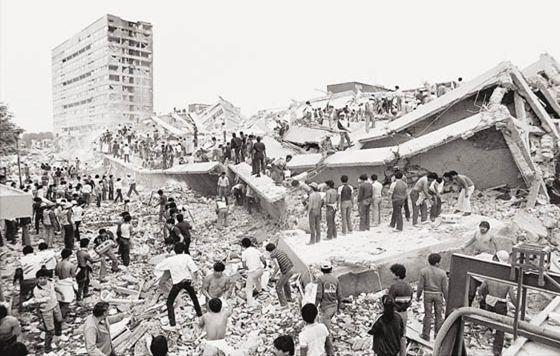Prepared or Not Prepared?
That Is the Question

I don’t know how many times I’ve heard people say things like, “I would not live in places where they have tornados or hurricanes,” no matter the good things that those places may otherwise offer. I understand that fear of big natural disasters. I have only to watch TV images of the places that have been hit, and my body shakes with empathy for people’s desperation, their pain, their loss of loved ones, and their loss of property.
“In California, we don’t share those dangers,” they say, to reinforce their argument. But, what about earthquakes? “Well, yes, but those are rare. They’re usually minor too. Sometimes, I don’t even feel them.” With these thoughts in mind, we think we can live happily ever after.

Notwithstanding our denial, earthquakes are as unpredictable and devastating as any tornado or hurricane, or more so. I went through the one in 1985 in Mexico City. That earthquake was a magnitude of 8.1 on the Richter scale. It lasted forever, it seemed. During the shaking, I was in my bed, embraced by my husband, crying. After we recovered from the shock, we immediately turned the TV on, to news reports about destruction and pain all over my beloved city. Suddenly, silence. No signal. We later learned that the station’s building fell and crumbled into pieces, and the anchors and the news staff died right then and there. On the radio was one lonely voice narrating, as he cautiously circulated the streets in his car, telling us about the buildings that were destroyed, from family homes to tall buildings, shopping malls to churches and hospitals – all gone. Thousands of people gone as well. Many more, disappeared.
A few hours later, I was sitting in my living room with my husband, no phone, no TV, and no sound of traffic coming from the streets. The only sound that howled through the streets was that of the emergency vehicles and their loud sirens in all directions. I can’t remember how I learned that all our family members were safe. Some friend’s family members weren’t as lucky. That night, the aftershock came – an aftershock of magnitude 6. Many of those who were still waiting to be rescued from the rubble lost all hope, many lost their lives.
I couldn’t take it any more, and we decided to get away to my parents’ home in a neighboring state for a few days, to get away from the danger and not hear the crying sirens anymore. My regret? That I fled, and that I did nothing to help others in such a time of need. I didn’t know how to help them, plus I was paralyzed from fear. I’m not proud of it, but what’s done is done. My promise is that this will never happen to me again. I learned then that we need to be prepared to help ourselves and our families, and to help others when a disaster strikes.
The City of Goleta is offering a Community Emergency Response Team training. At the end of the training, participants will know about basic safety fire prevention, the psychology of disasters, first aid, power search, and rescue techniques.
The training will start on Tuesday, January 29, 6:30 p.m.– 9:30 p.m. and continue every Tuesday through March 19, at the Goleta Valley Community Center, 5679 Hollister Avenue. This time, the training will be in Spanish – if you’re bilingual, sign up, or if you know a Spanish speaker, please spread the word about this training. At a future date, this same training will be offered again in English. Space is limited.
If we are all prepared, situations will be less difficult when a disaster strikes. For more information, contact Jaime Valdez at 805-961-7568.



